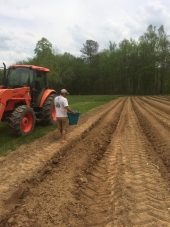


Unofficial Companion Guide to the Rocket Oven DVD
will be released to subscribers in:
soon!



 15
15




 1
1




 28
28




 5
5




 6
6




 ... going to have to take it back off now
... going to have to take it back off now  Some of this wood was going to be used for a raised bed garden that never got built so is rotting away, and some of it was a sundeck on my home that rotted and was removed to make room for a carport. Now I finally know a good way to get the raised bed gardens I want, and to save a bunch of money at the same time. No dump fees and no gas to haul it out there... BONUS!
Some of this wood was going to be used for a raised bed garden that never got built so is rotting away, and some of it was a sundeck on my home that rotted and was removed to make room for a carport. Now I finally know a good way to get the raised bed gardens I want, and to save a bunch of money at the same time. No dump fees and no gas to haul it out there... BONUS! Quote: Sometimes I don’t know what I do all day, but I know it takes me all day to do it. –A. G. Price, 2006
Blogs:
www.growinggreater.blogspot.com (my yard makeover)
www.born2cree8.blogspot.com (my fiber arts)
 4
4




 1
1




entrailer wrote:
Hi,
Do you have any more recent pics for your Hugel beds? Be great to see and hear how they've performed since you put them in.
How long ago did you build them? Also, where's the topsoil from?
Cheers,
Niels
 3
3




 8
8




 1
1




 5
5




 7
7




 . they were also quite tasty.
. they were also quite tasty.[img]http://i109.photobucket.com/albums/n52/havlik1/permie%20pics2/permiepotrait3pdd.jpg[/img]
"One cannot help an involuntary process. The point is not to disturb it. - Dr. Michel Odent
 2
2




 1
1




 2
2




 1
1




 1
1




 1
1




 what did best in your beds paul, normaly we do not get as much precip as seattle, last year we got twice as much ! this year i hope we get "enough"!
what did best in your beds paul, normaly we do not get as much precip as seattle, last year we got twice as much ! this year i hope we get "enough"! 
 3
3




 4
4




 2
2




 And once the chipper is gone, then a few rocks in the manure is okay.
And once the chipper is gone, then a few rocks in the manure is okay. 



 got some of the branches on site but when i went to move the logs they were still a solid mass! oh well, don't plant till mid may here any ways!
got some of the branches on site but when i went to move the logs they were still a solid mass! oh well, don't plant till mid may here any ways! 
 2
2







My Blog, Natural History and Forest Gardening
www.dzonoquaswhistle.blogspot.com
"Listen everybody, to what I gotta say, there's hope for tomorrow, if we wake up today!" Ted Nugent
"Suck Marrow" Henry D Thoreau
 1
1




Brenda
Bloom where you are planted.
http://restfultrailsfoodforestgarden.blogspot.com/
 1
1




 1
1








Brenda
Bloom where you are planted.
http://restfultrailsfoodforestgarden.blogspot.com/





TCLynx




Brenda
Bloom where you are planted.
http://restfultrailsfoodforestgarden.blogspot.com/
 1
1








"Although the world is full of suffering, it is full also of the overcoming of it." - Helen Keller
--
Jeremiah Bailey
Central Indiana
 5
5




 1
1






Brenda
Bloom where you are planted.
http://restfultrailsfoodforestgarden.blogspot.com/




If it is fungi that break down the wood in hugelkulture, then the process won’t include using lots of nitrogen. It is the bacterial break down of organic material that uses so much nitrogen. This may mean the problem of your logs absorbing nitrogen does not exist as it does with mulches, with logs buried and damp it is possible that they will be rotted by funguses that don’t not need nitrogen.
What worries me about using wood, is not that, the nitrogen used to rot the wood will leave little nitrogen for plants. It is having heard, years ago that the fungi that parasites on dead wood might spread to live wood. If different fungi parasite dead wood than live wood this does not matter, if you have a parasitic fungus on your wood in your hugelkulture maybe it does.
I read a gardening book but I can’t remember which, that talks about using urine, if you have it, to provide the nitrogen, bacteria digesting organic material need. It says that a straw bale will turn to sweet earth in three months if you pee on it. Another book says that you can keep a family in cabbages with the same resource if there are two men or two unprudish females in the family.
 1
1








TCLynx




entrailer wrote:
What do the panel feel the minimum depth of soil is required to cover a hugel "core" when planting trees?




 1
1




"the qualities of these bacteria, like the heat of the sun, electricity, or the qualities of metals, are part of the storehouse of knowledge of all men. They are manifestations of the laws of nature, free to all men and reserved exclusively to none." SCOTUS, Funk Bros. Seed Co. v. Kale Inoculant Co.
 5
5





|
Thanks tiny ad, for helping me escape the terrible comfort of this chair.
Learn Permaculture through a little hard work
https://wheaton-labs.com/bootcamp
|








